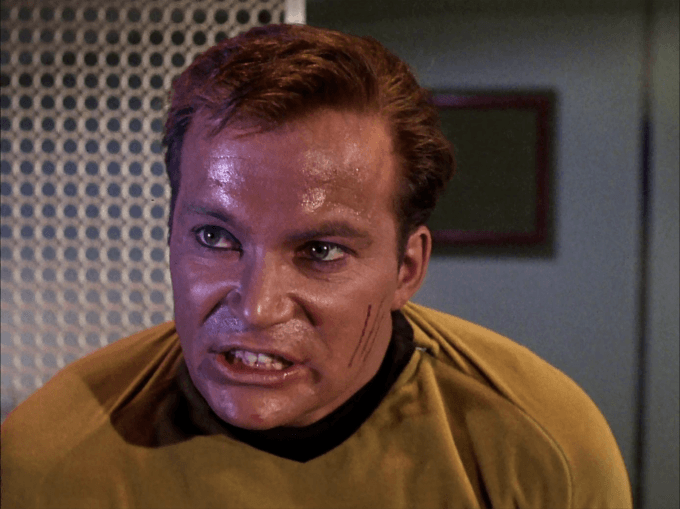
Still from “The Enemy Within” episode of Star Trek.
In “The Enemy Within”, Kirk is divided into two beings by a transporter malfunction. One of them is good but irresolute and weak, the other is the embodiment of evil and all the negative aspects of humanity. McCoy and Spock must come with a plan to reunify the two beings before a landing party consisting of Sulu and several other crewmembers freeze to death on the planet below. In the book The Ultimate Star Trek and Philosophy, here is how McCoy tries to help Kirk understand that we are not capable of being pure:
KIRK: I have to take him back inside myself. I can’t survive without him. I don’t want him back. He’s like an animal, a thoughtless, brutal animal, and yet it’s me. Me.
MCCOY: Jim, you’re no different than anyone else. We all have our darker side. We need it! It’s half of what we are. It’s not really ugly, it’s human.
KIRK: Human.
MCCOY: Yes, human. A lot of what he is makes you the man you are.… Without the negative side, you wouldn’t be the Captain. You couldn’t be, and you know it. Your strength of command lies mostly in him.
In the eyes of Professor Judith Barad, author of The Ethics of Star Trek, Aristotle would say that neither Kirk follows “the Golden Mean”. Therefore they are incapable of virtuous action, which is of great importance to a starship captain. Aristotle’s virtue ethics taught us that we should avoid extreme behavior, which is now clearly impossible for the two Kirks because they are polar opposites. To achieve the Golden Mean and perform virtuous actions, three conditions must be met:
1) “The person must know the quality of the act he or she performs. He must know what he is doing and know that it is a good thing to do.” Barad concludes that neither Kirk has what it takes to meet this condition.
2) “The action must be the result of choice and be chosen for itself. An act can hardly be called good if the person is forced to do it, or if he or she does not decide to do it.” Again, she says, both Kirks don’t make the cut. And lastly;
3) “A truly good action must reflect a firm and settled character.” This is also impossible under the prevailing circumstances. (pp. 99-100)
The only solution was not to simply kill evil Kirk, for as Spock observed “We have no previous experience” and no idea what might happen to good Kirk should his evil doppelganger die. So they use the newly repaired transporter to reintegrate the two men, and our normal, beloved and virtuous Kirk returns. Our Kirk follows The Golden Mean and is therefore capable of virtue, and would meet with Aristotle’s approval. Dr. Barad concludes that Kirk’s ethical code is based on both Aristotelian Virtue Ethics and Prima Facie Duty Ethics, the first of which was on display in this compelling episode (p. 331). I only wish Spock had not made that horrible comment to Yeoman Rand, who was sexually assaulted by evil Kirk early in the episode. As he had the nerve to say “The imposter had some interesting qualities, wouldn’t you say, Yeoman?” Blame that on the era in which the script was written! Despite the poor choice of words, this episode remains a classic and a great way to learn about moral philosophy.
NOTES
Kevin S. Decker and Jason T. Eberl (eds.).The Ultimate Star Trek and Philosophy: The Search for Socrates (The Blackwell Philosophy and Pop Culture Series). Wiley. Kindle Edition.
Judith Barad with Ed Robertson The Ethics of Star Trek (New York: Perennial, 2001).